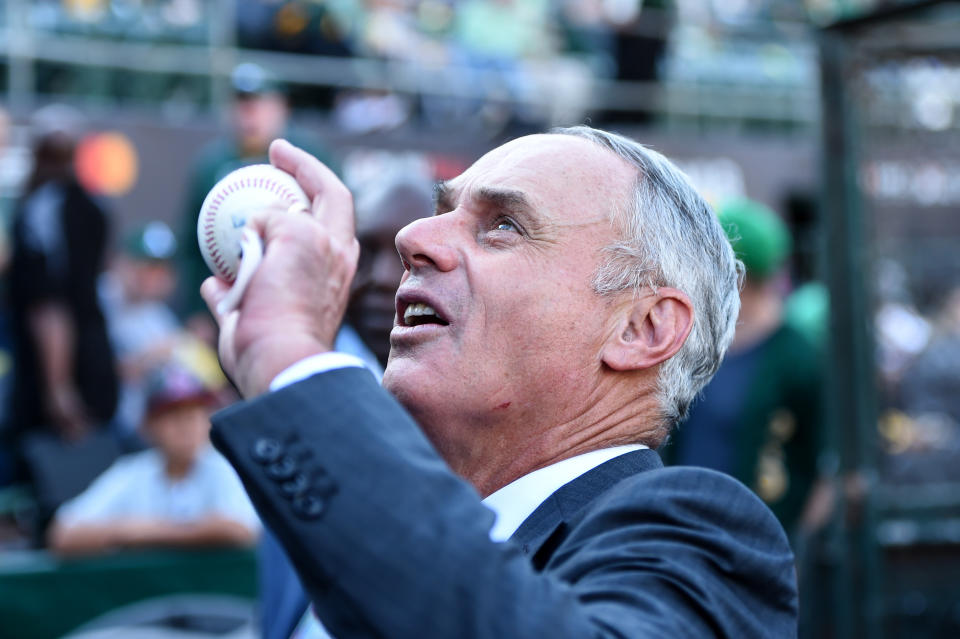After weeks of ugliness, labor warfare is back in baseball
Screw it, said the baseball players, turn it into a parade.
Weeks into a negotiation that had turned red-faced and spittle-y personal, players’ union chief Tony Clark on Saturday night declared the union would not respond to Major League Baseball’s most recent labor proposal and instead shot back, “It’s time to get back to work. Tell us when and where.”
Weary of a series of proposals it viewed as dressed-up versions of the last and unwilling to surrender full prorated player wages in any arrangement, the union delivered a letter to the league that rejected Friday’s offer and revealed it would not counter on economics or length of season.
Major League Baseball Players Association Executive Director Tony Clark today released the following statement: pic.twitter.com/d1p3Oj4K70
— MLBPA Communications (@MLBPA_News) June 13, 2020
That abruptly, the union, which once proposed a season of 114 games, dared commissioner Rob Manfred to institute the far shorter season (at full prorated salaries) he has insisted is what owners could afford.
Details remain. Lasting impact — the collective bargaining agreement expires in 18 months, possible grievances over the recent acrimonious negotiations, player rancor — remains. Animosity, distrust, even loathing, remain. The events of the past month will linger, even shape the future of the game, and not in a necessarily productive way. Labor warfare is back in baseball, featuring a union scalded by recent CBA failures and a league used to getting its way.
And so the league will have its way again, starting now, with the permission of a union positioning itself for another day and aligning with a public that has had enough of the two-side petulance. Those expanded postseasons designed to make the owners whole probably won’t happen. Some players may decide a season of 48 or 55 or 60 games is not enough of a season to risk infection. The majority will return to work, however, happy to be back on the field, mad at their bosses, aligned with their union brothers and subject to daily temperature checking.

In a three-and-a-half page letter addressed to MLB lead negotiator Dan Halem, union counterpart Bruce Meyer on Saturday laid out observations and complaints and explanations that he summed up near the end:
“Players remain united in their stance that a day’s work is worth a day’s pay, particularly in a situation where players and their families are being asked to take on additional burdens and risks. Given your continued insistence on hundreds of millions of dollars of additional pay reductions, we assume these negotiations are at an end. If it is your intention to unilaterally impose a season, we again request that you inform us and our members of how many games you intend to play and when and where players should report. It is unfair to leave players and the fans hanging at this point, and further delay risks compromising health and safety. We demand that you inform us of your plans by the close of business on Monday, June 15.”
Somebody had to bow to the inevitable. Somebody had to ask when and where. Cleverly, in a game it wouldn’t be allowed to win anyway, the union jelly-legged itself to the high ground. Assuming these are indeed the end to negotiations, that Manfred mandates a season that begins in about a month and ends in late September, and that is followed by a postseason the league is concerned could be imperiled by another wave of illnesses, and none of it is felled by a rash of positive tests before then, the union leaves having made a stand.
It is ready to play baseball. It is through with the ugliness of the past weeks. (There will be time for more ugliness later.) It will join with impatient fans and ask, “When and where?”
MLB responded later Saturday night. It did not offer a when or a where. The league instead defended its previous proposals, scolded the union for putting “thousands of other baseball employees” at economic risk and concluded, “We will evaluate the Union’s refusal to adhere to the terms of the March Agreement, and after consulting with ownership, determine the best course to bring baseball back to our fans.”
So, maybe, strictly speaking, the league wins. Again. But, hey, sometimes you gotta take the L. And turn it into a parade.
More from Yahoo Sports:


